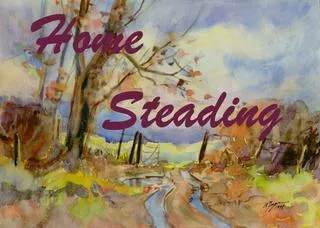Are circumstances in your life, forcing you to buy a cheaper home to live in and live off the land?

What are your options?
Have you considered living out in the country and running a smallholding farm? Are you thinking of growing your own vegetables, living close to nature and running solar heating, etc.
Dream of homesteading?
If you think it will be cheaper to plant a garden and live off a parcel of land, let me fill you in with reality. My husband and I once thought that too.
Warning bells:
It’s more expensive than you think. It’s like throwing money down a deep empty well.
Especially expensive if you work far from your little farm and trying to run it at the same time, after hours and weekends can be a nightmare.
It also expensive if you are far from shops, schools and hospitals, etc. You’ll have to transport your children to school every day, for sports events too, or if you put your children into boarding schools.
It can become horrendous if you aren’t careful:
- You can’t run things half-mast, without the right buildings and machinery.
- You need to buy good quality stock, cattle, sheep, etc. And that also includes vet fees.
- Cattle, fowls, etc have to have fencing, housing and food rationing during winter.
- You have to have McIver mentality when things break down. You live with what you have, making do for long periods, until you are able to drive into town for groceries, etc.
- Weather conditions and hard work are required to keep things running. For example fences to fix and chasing young cattle, to bring them in when it hails, etc.
So when we saw new people buying land and start living in the community, we used to smile to ourselves, “Shame, poor things, they don’t know what they’re in for!”
Let us look at it from another angle… here is a rural incident…
From great assets to dearth conditions:
Here in South Africa, fully working flourishing farmlands were given to rural citizens to farm. The reason for doing this was due to the government trying to give back homelands.
The new owners weren’t left without technical support and advice on how to run those farms successfully.
But sadly after a short time, those farms were no longer working. Buildings deteriorated, trackers and harvesting implements went rusty. Crops weren’t planted and the vast open tracks of land went to weeds.
How did this happen?
In the case I saw for myself on the Springboks Flats area north-east of Pretoria, the new owner’s family didn’t support him. They were too lazy to work the farm. There was no time or labour management.
When these new farmers were confronted, as to why their farms hadn’t been productive, they were very angry, said their nation had always been good farmers long before modern technology came along.
It seems they wanted to run the land again like the old glory homelands days, when herding and watching cattle and goats was sufficient!
One day followed the next… until all was lost! And some went into the city to find factory work.
Whichever way you look at it:
- Whether you are running a small holding or a big farm, you have to run it like a business to make it work! Have customer outlets, keep books and records. etc.
- And to run a business, you must know HOW to run it. As to farms, you must know the deeper knowledge of agriculture and farming husbandry procedures.
- You can’t `run it on a wing’! You have to have a regular income to make it work.
Next post on homesteading:
Having experienced homesteading for 21 years, I can however give a lot of advice on how to start up from nothing.